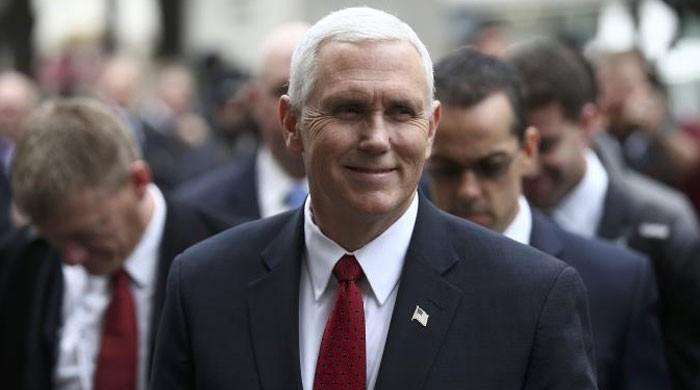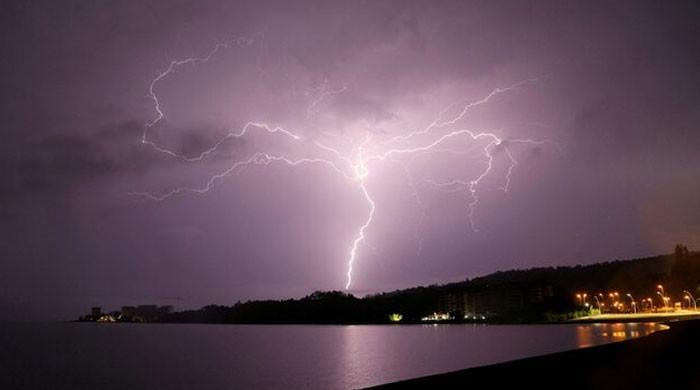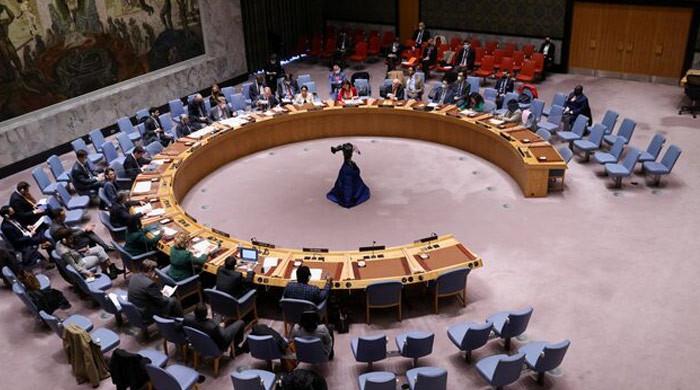Analysis: US vice president left Europe with more questions than answers
Europe is increasingly uneasy on Trump's statements attacking constitutionalism, press freedom, women's and minorities' rights, international trade treaties Irfan Aftab Khalid Hameed Farooqi
February 21, 2017

BRUSSELS: The two-phased visit of the United States Vice President Mike Pence to Europe, which included his visit to Munich and Brussels, ended somewhat with more questions by the Europeans than answers.
Pence delivered major policy speech at the Munich Security Conference insisting "US respects article five regarding common defense responsibilities but European Allies must understand their responsibilities according to article three of the NATO framework, which consists of common financial burden".
He further said, "Currently, only USA and four other countries are meeting Wales Summit Criteria, according to which every NATO member state would contribute 2% of her GDP to NATO budget. The European states, however, did not welcome his argument.
Europe sees the whole issue very differently. For Europe, there are range of issues regarding security vis a vis Russia. Europe believes Trump administration is bypassing its European allies on Ukraine and dealing with Russia bilaterally. After having followed the United States for last ten years, Europe feels that Trump administration is bent upon abandoning it.
On the other hand, Europe is increasingly uneasy on the statements by Trump attacking western values such as constitutionalism, press freedom, women's and minorities' rights, international trade treaties etc. The rift between EU and US is deeper than one thinks. But Europe seems still hoping to appease US with lofty words.
In the joint press conference by President of European Council Donald Tusk and US Vice President Mike Pence in Brussels, the EC president demonstrated the EU weakness and dependency on United States. Speaking to reporters, Mr. Tusk said, "I asked the Vice President directly if he shared my opinions on three key matters: the international order, security and the attitude of the new American administration towards the European Union. In reply to these three questions, I heard today from Vice President Pence three times 'yes'! After such a positive declaration, both Europeans and Americans must simply practice what they preach".
Reacting to this statement, Pence said, "the United States' commitment to the EU is steadfast and enduring." He went further and reminded the audience in Munich about article three of the NATO framework, that deals with shared financial burden.
“We vowed in that treaty to contribute our fair share to our common defence,” Pence said. “The promise to share the burden of our defence has gone unfulfilled for too many for too long and it erodes the very foundation of our alliance. When even one ally fails to do their part, it undermines all of our ability to come to each other’s aid”, he added.
In view of President Trump's support to Brexit and advice to other countries particularly France to leave the European Union, European leaders know what Trump administration is up to, despite being cordial with Vice President Pence, who asserted, "Our economies are the world's largest; accounting for half of the world's economic output. Transatlantic commerce supports 14 million jobs. Today we reaffirm our commitment to free fair and flourishing economies".
These nice statements were issued despite deepening conflicts over trade issues as Trump scrapped Trans-Pacific Partnership, which was achieved after years of negotiations. The main difference lies in the protectionist Trump administration as opposed to the European administration that still believes in free trade.
Another major difference is between the approaches towards so-called Islamic militancy. Pence called upon EU to intensify efforts as well as greater intelligence cooperation with the US to counter the threat of Islamic terrorism in Europe, US and at global level. The EU, however, does not share its citizens' private information like flight data with the US, but Trump administration wants EU to provide information from banking to flight details to US anti-terrorist authorities.
Adding insult to injuries, Mr. Pence said that the US shall also search new ways to achieve common grounds with Russia. Besides that, EU wants full implementation of nuclear deal with Iran as the EU High Representative, Ms. Federica Mogherini clearly said. Contrary to this, President Trump wants this deal to be scrapped.
The US Vice President later met NATO Secretary General Jens Stoltenberg at its headquarters. Addressing a joint press conference after the meeting, the two figures did not go beyond diplomatic niceties and terminologies. Again, Mr. Pence repeated the demand that NATO countries had to fulfil their financial obligations to keep the US assisting in maintaining security of Europe under NATO. The response by the German minster was negative. He said Europe was trying to lower the taxes, which made increase in the defense spending impossible.
The 53rd Munich Security Conference ended on Sunday with mixed and confusing signs on global security environment. Europe seems unsure whether United States wants to lead the global security or not. Unlike World Economic Forum, where China is increasingly seen as leader of 'Globalisation’, there is no alternative to the US as far as global security is concerned. Mr. Pence delivered the message of President Donald Trump that United States remained committed to NATO. He gave assurance to the US support for global order and tried to address concerns of Europeans that President Trump might deal directly with Putin. The US vice president promised that Russia will be held “accountable” for its actions in Ukraine, though it wasn’t clearly described how. The audience, anyhow, welcomed this statement.
Speaking right before him at this year's Munich Security Conference, German Chancellor Angela Merkel told US Vice President Mike Pence "Germany will live up to its promise to increase military spending but on its own schedule.” Merkel said, referring to a ten-year plan to ramp up Germany's military budget by 2024, which was agreed among NATO member states at a summit in Wales in 2014, "We will do everything we can in order to fulfil this commitment."
However, speaking after Pence, Germany’s Foreign Minister Sigmar Gabriel made it clear, as did Chancellor Angela Merkel earlier, that the country did not intend to be bullied by the Trump administration into increasing defence spending. “I don’t know where Germany can find billions of euros to boost defence spending if politicians also want to lower taxes,” Gabriel said.
While there are fears in Europe too, of Russian intervention through cyber-attacks or the spread of fake news in upcoming elections in the Netherlands, France and Germany, German Chancellor Angela Merkel hailed ‘multilateralism’ in terms of preserving global values. "Multilateralism is crucial at a time of increasing crises and fear of the rise of nationalism", she added.
US Vice President Mike Pence was accompanied by Secretary of Homeland Security John Kelly and Secretary of Defence James Mattis. Mattis also addressed assembled group of leaders. Despite of being well represented at 53rd Munich Security Conference, Trump's administration failed to satisfy all those unanswered questions.










